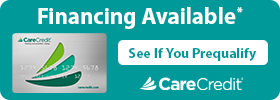Affordable, Achievable Financing Options
Thankfully, a number of flexible options are available to make financing surprisingly manageable - options that don’t involve high interest rates or complicated terms.
We’re here to help you find the financing path that’s right for you. Our staff are well versed in available financing options, and will be happy to guide you, answer any questions, and recommend the best options.
CareCredit
CareCredit
Many patients find CareCredit to be a helpful option to finance eye care expenses such as LASIK, refractive lens exchange, or multifocal IOLs. CareCredit is a healthcare credit card with special financing options designed exclusively for medical services. Available financing plans include:
0% Interest Plan For 2 Years
(shorter-term financing plan)
When you make minimum monthly payments and pay off the loan fully by the end of the 24-month period, this plan offers
0% interest
No down payment
No fees or penalties for early payment
Low-Interest Plan For 36, 48, 60 Months
(extended financing plan)
This plan offers:
Low, fixed interest rates
No down payment
No fees or penalties for early payment
Reasonable fixed payments
Learn more by visiting www.carecredit.com.
We are not affiliated with CareCredit and do not receive any compensation or incentives from them.
Subject to credit approval. Please note that CareCredit requires you to make payments on time to maintain these low promotional interest rates. Visit www.carecredit.com for details.
Calculate what monthly payments would be under each plan:
Tax Savings Using FSA and HSA Funds
Whether you are self-employed or work for an employer, you may be eligible to open an FSA (flexible spending account) or HSA (health savings account).
Both allow you to set aside money pre-tax to pay for out-of-pocket medical expenses. Individuals working for an employer can be eligible for an HSA or an FSA if they meet eligibility requirements. Self-employed individuals are eligible for HSAs only.
The funds you contribute are not taxed when you withdraw them to pay for the qualifying medical expenses. You can therefore derive significant savings by deducting these expenses from your taxable income.
As of 2020, Lasik surgery is an IRS-approved medical expense that can be paid for, tax-free, with HSA and FSA funds. Your employer or your tax advisor can guide you as to which options are best for you.

